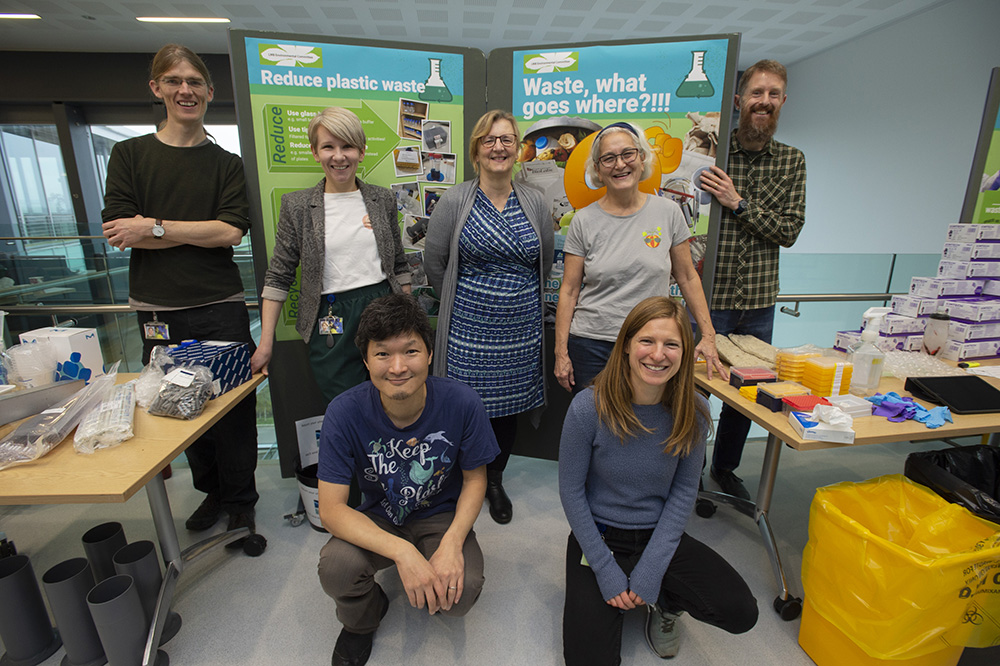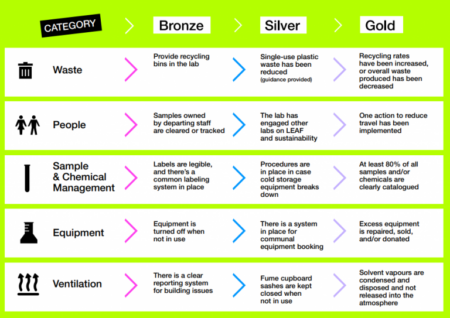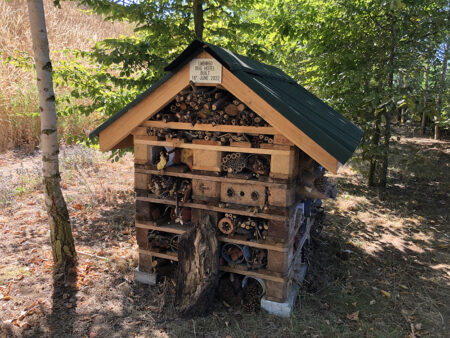
The LMB has achieved the Laboratory Efficiency and Assessment Framework (LEAF) silver accreditation for its efforts towards creating a more sustainable laboratory. LEAF is a green initiative developed by University College London which provides a set of standards to improve the efficiency and sustainability of laboratories and technical workspaces. The silver accreditation was achieved by meeting 33 criteria based on different aspects of sustainability, which include waste management and reduction, cold storage, staff engagement, reduction in energy use, reduction in use of chemicals, reagents, and consumables, and encouraging equipment repair and re-use. The LEAF initiative aligns with the MRC’s commitment to achieve a net zero position by 2040, with a 50% reduction in carbon footprint by 2030.
The LMB has an established Green Committee and has more recently formed a lab sustainability team. Green Reps have also been recruited from groups across the institute to engage staff in sustainability. Together these groups and individuals help encourage sustainable behaviour and disseminate information throughout the institute, for example raising awareness of recycling and re-use routes to reduce general and clinical waste.

Eszter Zavodszky, Senior Investigator Scientist at the LMB and Green Rep, commented: “I think it’s important for us all to be thoughtful of how we use resources for our work, because scientific research can generate a fair bit of waste if we’re not careful. With some planning, the green committee’s tips have already helped our lab reduce a lot of the waste that we had been generating, and we’ve been able to decrease our energy consumption too.”
One major sustainability success story at the LMB has been raising the set temperature of its ultra-low freezers from -80°C to -70°C. The set-point on 70% of the freezers has been increased and they are working towards 100%. A single freezer set at -80°C uses the equivalent energy to an average house and converting it to -70°C reduces the energy consumption by around one third. It is estimated that this increase in set-point has saved 50 tonnes of carbon per year, equivalent to 126,654 miles driven by a petrol car.
An area that the Lab Sustainability team have really focused on is engagement with the staff to make people more aware of their impact on the environment and what they can do both at work and at home to reduce it. Poppy Marriott, Deputy Laboratory Services Manager and Sustainability Officer, said: “We held an event in November 2022 which focused on four aspects of sustainability that have the largest impact in the lab: plastic reduction, cold storage, waste management, and energy usage of equipment. Many people attended and were really engaged. We also had a sustainability stall at the LMB Open Day in 2023 where we let the public know what we are doing to reduce our environmental impact.”
The LMB’s Estates team have an established track record of making changes to the building to make it as efficient as possible and continue to find opportunities to increase the building’s efficiency. Recent initiatives have included reprogramming lighting systems to minimise the amount of time artificial lighting is used and reducing background lighting levels in periods of low occupancy. The LMB building has both low-energy ground source heat pumps and heat recovery wheels as part of its sustainable technology and the team work hard to ensure that the outputs from these systems are optimised all year round. The technology behind the thermal wheels uses exhaust air from the labs to reheat incoming cold air and now saves 65 tonnes of carbon every year. The number of times the air is changed per hour has also been reduced during out-of-hours periods so much that the high-efficiency heat pumps can now supply almost all the building’s heating rather than having to burn gas.

Poppy added: “We’re not just focused on carbon footprint and waste reduction. We have also implemented actions to improve biodiversity on site, such as converting ground to wildflower meadow and planting perimeter woodland to maintain a diverse range of landscapes, important for nesting birds and insects. We also built a nature pond which helps to protect the local populations of insects, amphibians, small mammals, and reptiles, and installed swift boxes and a bug hotel.”
The LMB has now started to work towards the LEAF Gold award to improve sustainability in the laboratory even further. On the estates side, efforts are underway to establish a building decarbonisation pathway which will include the installation of solar panels and will see the phased removal of gas-fired plant from within the building over the next few years.
Further references
MRC announces membership of laboratory efficiency framework
MRC efforts and plans to reach net zero
LEAF – Laboratory Efficiency Assessment Framework